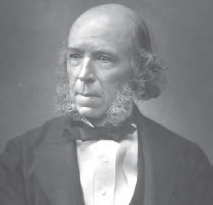Nineteenth Century PhilosophyHerbert Spencer |
Who was Herbert Spencer? |
Herbert Spencer (1820–1903) was a philosopher and social reformer who was assistant editor-in-chief of The Economist. He also wrote for the Westminster Review, while George Eliot was its editor. Spencer was an atheist, without any training in the humanities, and he believed that only science could yield useful knowledge. In his ethics, he combined Jeremy Bentham’s (1748–1832) version of utilitarianism with John Stuart Mill’s (1806–1873) view that happiness is the true end. Spencer thought that pleasure and pain were evidence of happiness or unhappiness.
Spencer is best known for his evolutionary views that predated Charles Darwin’s publication of On the Origin of the Species by Means of Natural Selection (1859). Spencer’s main publications were works he published in his major project System of Synthetic Philosophy, beginning in the 1850s, and 1884’s The Man versus the State.

